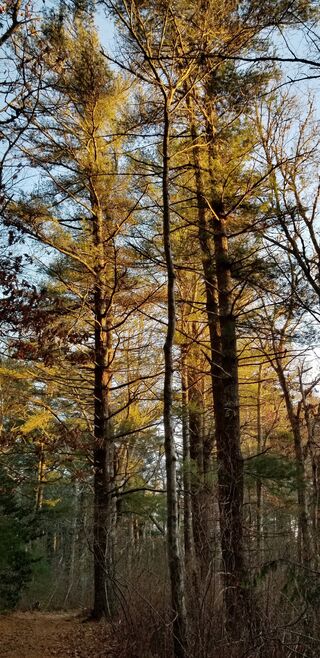Environment
What a Woodland Can Teach Us About Human Society
The symbiosis in wild land highlights recent polarization in the U.S.
Posted January 28, 2022 Reviewed by Tyler Woods
Key points
- How microbes, plants and animals live together contrasts with an America split by politics.
- Contrast the pervasive divisiveness afflicting this country with the diversity of life and the level of connection that exists in soil.
- The lessons our environment teaches clearly have implications for how we run human affairs.

I have the good fortune to live near a protected forest surrounding a body of water called Eagle Pond, and I run or walk there as much as I can, in all seasons. The stewards of this wildlife sanctuary wisely limit human interference to a few small signs, and paths often so narrow and root-racked they resemble deer trails. As a result, it remains a nearly wild environment of white and pitch pine, scrub oak, holly, bogs of cedar and maple, checkerberry, and poison ivy; all surrounding a kettle pond formed between 5 and 15 thousand years ago when a large chunk of ice, melting slower than the receding glacier, left a depression soon filled by spring water and run-off.
The trees are second- or third-growth—the land was once devoted to farming turkeys and cranberries—but that fact only emphasizes the power of Earth's natural environment to accept change and turn it into something beautiful. Perhaps it's the endocannabinoids produced by running that are responsible for this feeling, but the richness and quiet of Eagle Pond always elicit in me a deep appreciation for nature's ability to create a web of different life forms that subsist together and balance each other out. That appreciation has only grown at a time when polarization in American society and politics has reached a level unseen in a generation.
Contrast the pervasive divisiveness afflicting this country with the diversity of life and the level of connection that exists in a place like the Eagle Pond preserve. While a teaspoonful of farm soil contains over a billion bacteria, several yards' worth of fungi, plus thousands of nematodes, arthropods, and plant roots, the same amount of forest soil contains up to 2,000 times that amount of life. If I scoop up a handful of Eagle Pond dirt I will hold many times more living beings than exist in the entire human population of Earth. Not only that: recent research suggests that many, if not most, of these species are interconnected in a network, termed the "rhizosphere" or a "mychorrizal fungi association," in such a way as to warn each other of threats, or signal a need for particular nutrients. The overall result is an ecology that balances itself, year after year, in such a way as to safeguard the lives of its inhabitants, purify air and water, trap carbon in the soil, and reduce erosion and flooding.
The Ecoliteracy website emphasizes the analogy with human interaction. Soil organisms "are an interdependent community sharing responsibilities analogous to many of those in a human city: generation and distribution of energy and resources, infrastructure construction and maintenance, health and safety, civil defense, communications, waste treatment... As with other complex systems, the well-being of the organisms within the soil community depends on the well-being of the whole—its members and the relationships among them."
Perhaps not coincidentally, the human body consists of a similar community, where the roughly 30 trillion human cells work with roughly 39 trillion microbial cells to digest food, facilitate gene function, and bolster our immune system, among myriad other tasks.
Recent research has found that participants who spend time in a natural setting like the Eagle Pond reserve enjoy drops in blood pressure, heart rate, and stress hormones when compared to people in city environments. Science seems to agree with what I feel instinctively, and the lessons such an environment teaches clearly have implications for how we run human affairs.


